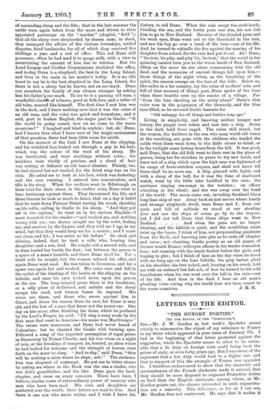"THE HUNGRY FORTIES."
SIE,—Mr. J. W. Gordon in last week's Spectator seems utterly to misconceive the object of my reference to France in my letter which appeared in your issue of January 7th. I had in the beginning of that letter protested against this suggestion, which the Spectator seems to allow to be unten- able, that a 2s. duty on foreign corn could bring back the prices of sixty, or even forty, years ago. But I was aware of the argument that a low duty would lead to a higher one, and that in support of this the example of France was appealed to. I therefore endeavoured to show that the character and circumstances of the French electorate made it natural that they should be more disposed to augment Protective duties on food than the English electorate, among whom, as Mr. Gordon points out, the classes interested in such augmenta- tion are a minority. This difference, as far as I can see, Mr. Gordon does not controvert. He says that it makes it important to consider the working of Protection in England, an expression exemplifying the proverb, Dolus latet in generalibus, as he thus identifies, under one general name, the 2s. duty of Mr. Chamberlain with all the different scales of duty which prevailed from 1815 to 1846. This is simply playing with words. But if Mr. Gordon means that the Corn- laws of the " forties " were an instance of a high duty growing out of a lower one, surely he altogether overlooks the facts. The high duties imposed after the peace, in alarm at the sudden fall of prices, were repeatedly modified and reduced in the interval between that time and their final abolition. And had it not been so, it still would be unsafe to argue from the constituencies of 1815 or 1842 to the probable action of those of the present day. Does Mr. Gordon maintain (1) that any proposal now before the country would of itself raise present prices even to what they were some time after the repeal of the Corn-laws ? or (2) that the constituencies when they see the effect of a small duty on corn will lie ready to accept any proposal for largely augmenting it. The latter, as I said in my former letter, would seem a strange admission from a "Free-fonder." Yet this, and this only, is what the " thin-end-of-the-wedge " argument must mean. Let me suggest what seems a parallel case. Suppose that in any country there has been once an Income-tax of 4s. in the pound, which had been altogether abolished. If years afterwards it were proposed to reintroduce an Income-tax on some such Scale, as we all are familiar with, there might be arguments of some weight for or against it. But what fair disputant would denounce its whole principle simply on the ground of the inconveniences attributed to it at its old high figure ?- I am, Sir, &c., COLCHESTER. St. Bruno, Sunningdale.
[To THE EDITOR OF THE " SPECTATOR.1







































 Previous page
Previous page